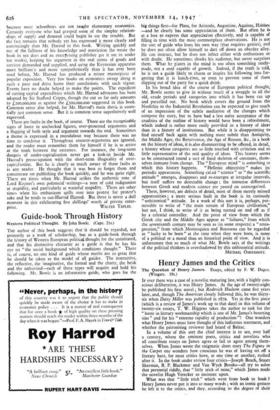Guide-book Through History
Western Political Thought. By John Bowle. (Cape. 21s.)
THE author of this book suggests that 'it should be regarded, not primarily as a work of scholarship, but as a guide-book through the history of Western European political..thought for the uninitiated, and that his distinctive character as, a guide is that he has his eye. on " the social background which conditions thought." There is, of course, no one kind of guide whose merits are so great that he should be taken as the model of all guides. The instructive, the reflective, the imaginative, the formal and the chatty, the brisk and the unhurried—each of these types will acquire and hold his following. Mr. Bowls is an informative guide, who goes for the big things first—for Plato, for Aristotle, Augustine, Aquinas, Hobbes —and he clearly has some appreciation of them. But often he is at a loss to express that appreciation effectively, and is capable of filling in time with the most commonplace observations. He is not the sort of guide who loses his own way (that requires genius), and he does not often allow himself to dart off down an obscdre alley. He can instruct, but he does not infect either with enthusiasm or with doubt. He sometimes shocks his audience, but never surprises them. What he plants in the mind is too often something ready- made, not a seed capable of growth. Indeed, if the truth is told, he is not a guide likely to charm or inspire his following into for- getting that it is lunch-time, or even to prevent some of them, slipping out of the party for a quick drink. In his broad idea of the course of European political thought; Mr. Bowle seems to give in without much of a struggle to all the old, crude periods and categories into which it has been cut up and parcelled out. No book which covers the ground from the. Neolithic to the Industrial Revolution can be expected to give much of an impression of the subtle mediation of the changes which compose the story, but to have had a less nave acceptanCe of the crudities of the outline of history would have been a refreshment, which indeed is rather more easily provided in a history of ideas- than in a history of institutions. But while it is disappointing to; find oneself back again with nothing more subtle than Antiquity, the Middle Ages, the Renaissance, the Age of Reason, &c., in a book on the history of ideas, it is...also disconcerting to be offered, in detail, a history whose categories are so little touched with criticism and so little representative of the real quality of ideas. This history seems to be constructed round a sort of fixed skeleton of constants, them- selves immune from change. The " European mind " is something to which this history happens. "Hellenic objectivity" makes its periodic appearances. Something cal.ed " science " or " the scientific attitude " emerges, disappears and re-emerges at irregular intervals,: but itself suffers no detectable change ; the immense differences' between Greek and modern science are passed on unrecogn'sed.
These, however, are defects of detail, most of them merely missed opportunities ; a more serious fault in the book is its curiously " unhistorical " attitude. In a work of this sort it is, perhaps, per- missible to write of " the main stream of European civilisation," but not, I think, to write of it as being turned on and off as if by a celestial controller. And the point of view from which the Greek city and the Middle Ages appear as " failures," from which the seventeenth century may be seen as (in some respects) a " retro- gression," from which Montesquieu and Rousseau can be regarded as " lucky to be born " at the time when they were born, is more of a political or a moral than an historical point of view. And it is unfortunate that so much of what Mr. Bowle says of the writings of the political thinkers is overshadowed by this unhistorical attitude.
MICHAEL, OAKESHOTT.






























 Previous page
Previous page